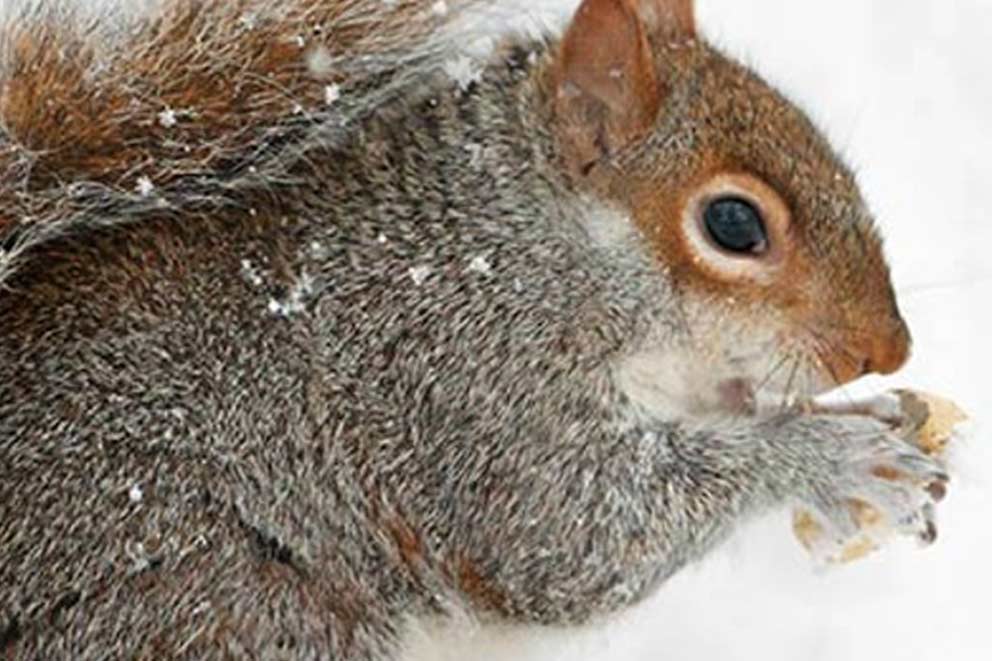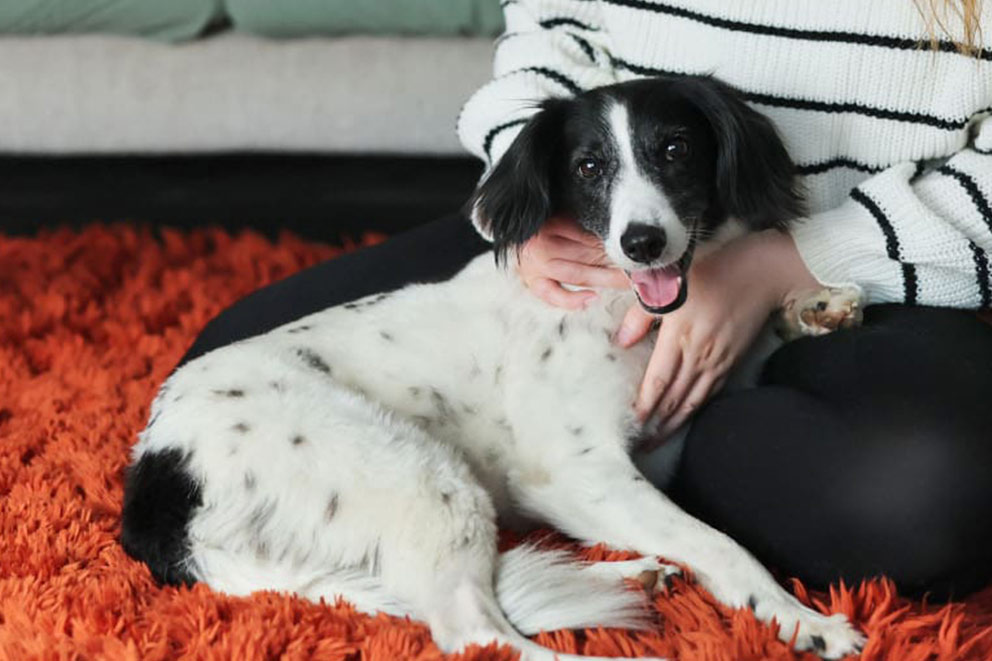How to keep your pets safe from Christmas dangers
Christmas is the time for festivities and feasting – but for pets, it’s a time for foods, plants and objects that, if ingested, can make them seriously ill. Find out how to keep pets safe at Christmas, the potential poisons and hazards to avoid and what to do if you think your pet has eaten something dangerous.
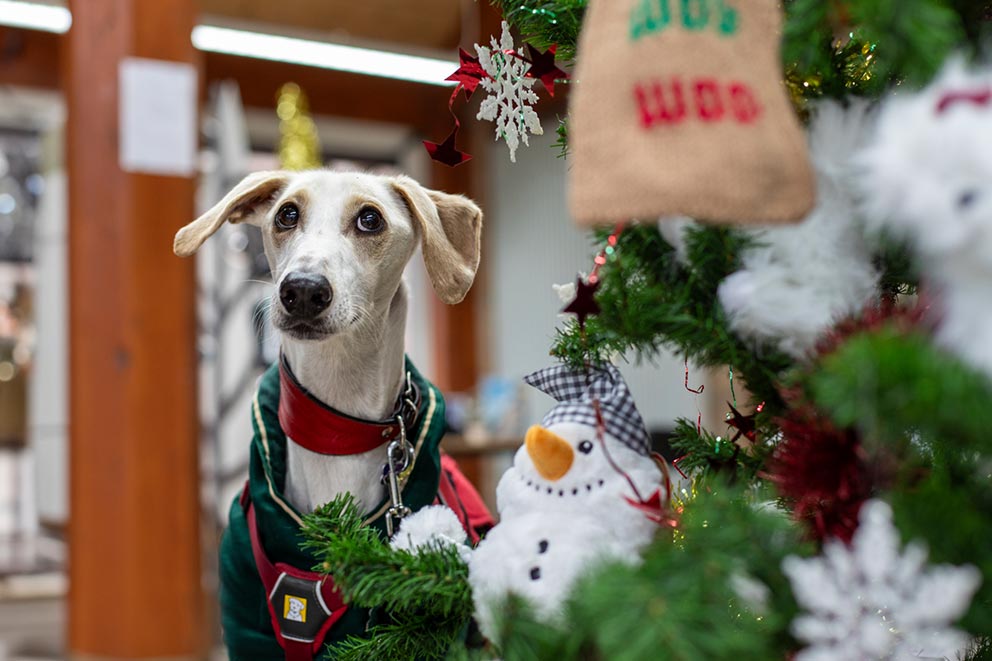
Jump to:
Has your pet been poisoned?
If you think your pet has eaten something poisonous, or you’re unsure if something they’ve eaten may be harmful, take them to your vet immediately. Not all poisons cause immediate symptoms.
Do remove your pet from the source of the poison/toxin.
Do collect what they’ve ingested and take a sample to the vet (including any packaging).
Do not try to make your pet vomit.
Do not give them salt water.
Unable to speak to a vet?
Contact Animal PoisonLine on 01202 509000 (this is a 24-hour emergency phone service which does require a fee).
Unsafe foods for animals
Alcohol
Blue cheese
Chocolate
Dairy products
Mint sauce
Meat bones (especially if cooked!)
Garlic
Nut butters (containing xylitol)
Sweets
Bacon
Chives
Christmas pudding
Dried fruit (sultanas, raisins, etc)
Mince pies
Leeks
Gravy
Nutmeg
Sugar-free foods (containing xylitol)
Bread sauce
Cranberry sauce
Christmas cake
Mouldy food
Macadamia nuts
Onions
Grapes
Walnuts
Pigs in blankets
Xylitol
Never feed your pets any foods that contain xylitol – such as sugar-free chewing gum, breath mints, baked goods, cough syrup, nut butters and sugar-free desserts, etc – as it’s extremely toxic. Signs of xylitol poisoning include: vomiting, lethargy and sleepiness, disorientation and unsteadiness, collapse, seizures and tremors, and falling unconsciousness or into a coma.
If your pet has consumed xylitol, take them to a vet immediately.
Poisonous Christmas foods
Cat and dog poisoning at Christmas is common, as there’s more food in the house than normal, and some of our favourites can be highly toxic to our pets. If you’re ever unsure whether a certain food is safe for your pet, don’t give it to them until you’ve checked.
Christmas dinner
Meat on the bone
Bones from meat carcasses (such as turkey or chicken) are dangerous. They can lodge in your pet’s throat and choke them, splinter and break and, if swallowed, pose a risk of internal blockages and intestinal perforations.
Throw any bones straight into your outside bins to prevent your pets from rummaging through the one inside.
Onions, garlic and leeks
Onions, garlic, leeks, shallots and chives are all part of the same plant family, and can damage your pet’s red blood cells, leading to anaemia – which can be life threatening. They’re toxic to pets, even when cooked.
Signs that your pet has ingested one or all of these foods may be subtle, but if they’re showing any of the following symptoms, contact your vet immediately:
- Vomiting
- Diarrhoea
- Abdominal pain
- Lethargy
- Quicker breathing
- Anaemia, which presents as pale gums and a fast heart and respiratory rate – though signs may not be noticeable until days later.
Sauces
Apple sauce is unsuitable for cats, but dogs can have it when unsweetened. Mint sauce and cranberry sauce are unsuitable for all pets, as is bread sauce, which contains onions and garlic. Gravy can contain high levels of salt and fat, which can be dangerous for pets.
Alcohol
Alcohol is not suitable for pets – ingesting it can lead to:
- Drowsiness
- Wobbliness
- Low body temperature
- Low blood sugar levels
- Seizures or comas
Try not to leave your tipples unattended and within reach of your pets.
Christmas puddings, treats and snacks
Chocolate
Chocolate is one of the most common causes of poisoning in pets, especially over Christmas. It contains a chemical – theobromine – which is toxic to cats, dogs and other pets, causing:
- An increase in heart rate
- Vomiting
- Diarrhoea
- Tremors
- Seizures
Dark chocolate is the most toxic, as it contains more theobromine than milk chocolate. White chocolate has a much smaller risk, but it’s still best to avoid giving any chocolate to your pets as any amount can agitate them, leading to heart problems and convulsions.
Not all cases require treatment – the best option is to phone your vet, who can calculate the chocolate toxicity on your behalf (you can also calculate it yourself with a chocolate toxicity calculator, though asking your vet first is always recommended).
In severe cases, ingesting chocolate can be fatal for pets. Take them to the vet immediately if you think they’ve eaten some.
Dried fruit and grapes
Dried fruit like sultanas, raisins and currants, and also grapes, are toxic.
These ingredients are often found in Christmas pudding, Christmas cake, mince pies and even fake reindeer food – so avoid giving these to your pets.
- Urinating less
- Drinking more
- Reduced appetite
- Vomiting and diarrhoea
If your pet eats any dried fruit, take them to the vet immediately.
Note: Rabbits and guinea pigs can eat very small quantities of grapes, but don’t let cats and dogs eat any, as they’re poisonous.
Nuts
Nuts are typically low in toxicity, but can still cause stomach upset in your pets. Macadamia nuts, however, are toxic to cats, dogs and other animals. Symptoms of macadamia poisoning include:
- Wobbliness
- Pain when walking
- Vomiting
- Tremors
- Raised body temperature
- Lethargy
- Stiffness
These symptoms may not appear immediately, but can last up to two days. Chocolate-coated macadamia nuts could also cause chocolate-poisoning. If you think your pet has eaten macadamia nuts, take them to a vet immediately.
Crisps
Crisps, like gravy, are high in sodium fat. If your pet eats an excess of crisps, it could result in diarrhoea, vomiting and even seizures. However, they’re okay when given in small quantities.
Blue cheese
Blue cheese contains a substance called Roquefortine C that’s toxic for pets. Symptoms include tremors and seizures, which can last days. If you think your pet has eaten blue cheese, take them to the vet immediately.
Other dairy products
Creams, cheeses and other milk items can be tricky for your pets to properly digest, causing upset stomachs and even sickness and diarrhoea.
Fatty foods
Feeding them extra over the festive seasons might feel like a treat, but can quickly become a problem. Eating too many fatty foods can lead to pancreatitis, which can be fatal, as it causes inflammatory symptoms – seek urgent veterinary attention if pancreatitis is suspected.
Initial symptoms may appear as:
- Vomiting
- Diarrhoea
- Less of an appetite
- Abdominal pain
- Appearing depressed
Leftovers
- Vomiting
- Tremors
- Convulsions
- Seizures
Avoid foods that get mouldy quickly like breads and dairy products. If you think your cat or dog has eaten your Christmas leftovers, contact your vet. If you have any leftovers that are safe to share, consider also sharing with wildlife.
Inedible food-related items
Christmas food packaging and presentation can also be dangerous. Your dog may accidentally eat the turkey string or cooking twine, your cat might chew on the foil wrapper from chocolate coins, cocktail sticks could accidentally be ingested, and other linear foreign bodies like string or yarn can all cause severe internal damage.
Secure and store your foods
The best way to prevent your cat or dog from eating Christmas trimmings, treats or leftovers is to keep the foods away from pets. Store them securely in a place they can’t easily access, and try to stick to pet-friendly treats. If there are edible items in presents under the tree, move them, as pets can sniff them out!
Pet-safe alternatives
Cats and dogs
Try to keep your pets on their normal diets where possible (many pet food brands offer Christmassy versions of their regular foods) to avoid weight gain. But, if you’re getting those puppy dog or kitty cat eyes, here are some pet-safe Christmas food options that are suitable for cats and dogs in moderation:
Broccoli: Boiled or steamed.
Brussel sprouts: Cooked until soft.
Cabbage: Cooked red or green variety.
Carrots: Dogs can eat carrots raw, but cats can only eat them raw if chopped into small chunks, otherwise cook until soft (to prevent choking).
Cauliflower: Cooked and cut into small pieces.
Green beans: These can be eaten raw or cooked, but make sure they’re unseasoned.
Parsnips: Boiled, and without seasoning or glazes.
Peas: Both cats and dogs can have plain peas, but dogs get more nutritional benefits from them. Cats should only be given a small amount as a treat.
Potatoes: But only if they’re mashed, boiled and don’t contain additional foods like butter or cheese (though these are also okay in small quantities).
Salmon: Cooked and boneless.
Skinless and boneless white meat: Turkey – without its skin or bones – and plain cooked chicken are fine in small amounts, as long as they’re not covered in seasonings, fat, salt or gravy.
Swede: Chopped or mashed.
Pet-safe alternatives
Smaller pets
For smaller pets like rabbits, guinea pigs, hamsters and gerbils, safe foods include:
Broccoli (only a small amount – it can cause gas)
Brussel sprouts (only a small amount – it can cause gas)
Cabbage (dark green variety)
Cauliflower (leaves and stalks)
Carrot tops
Green beans
Parsnips
Peas (leaves and pods)
Festive food can be poisonous to pets
Festive food is delicious, but much of it is highly toxic and dangerous to our pets. Avoid giving your cats, dogs or small furries (such as rabbits and guinea pigs) these foods as they can make them unwell:
- Chocolate
- Mince pies
- Christmas pudding
- Onion gravy
- Alcohol
- Meat on the bone
Bones from carcasses are a dangerous choking hazard and can pose a risk of internal blockages and cause intestinal perforations.
Additionally, while rabbits and guinea pigs can eat grapes in small quantities (as they are very high in sugar), they’re poisonous to cats and dogs.
Christmas foods safe for pets
Skinless and boneless white meat such as turkey is okay for dogs and cats, but be careful that it's not covered in fat, salt or gravy. Your pets should stick to their normal food.
If you want to treat your pet to festive bites, try our easy-to-make cat and dog treats below. Be sure to feed treats in moderation, as extra weight isn't good for their health.
Dog-safe DIY Christmas treats
Why not try making some of our tasty, healthy dog treats for your canine companion? Watch our video on how to make yummy, homemade Honey and Banana Dog Biscuits.
Cat-safe DIY Christmas treats
Make your cat delicious and healthy treats by following the instructions in our short video.
Festive plants can be poisonous to pets
Some festive plants and flowers can be toxic to pets, including:
- Poinsettias
- Holly
- Ivy
- Mistletoe
- Lilies
Pet-proof your Christmas tree
- Avoid using breakable baubles but if you do, hang them higher up.
- Avoid chocolate decorations.
- A tree stand may prevent cats from climbing up from the bottom.
- Anchor the tree to a wall to prevent it from falling.
- Provide alternative cat enrichment. Cats can be inquisitive and Christmas trees are novel and exciting so providing lots of other activities such as toys and feeding puzzles might keep them occupied elsewhere.
- Tinsel, wrapping paper, hanging decorations and especially edible decorations might be tempting for your pet to play with, but make sure they don't eat them!
Keeping pets calm at Christmas
Christmas can be stressful for pets. Changes in routine, visitors, children, loud music and decorations can all worry them. Planning can help minimise stress for pets and ensure they have a happy home at Christmas. Here are our top tips for helping your pets have a stress-free Christmas:
Dogs and cats
- Stick to their routine - try to keep food, exercise, bed and toilet break routines the same, as consistency can help pets feel more secure.
- Introduce new people carefully - if you have visitors, let your dog or cat meet people at their own pace.
- Give them somewhere cosy and quiet to retreat to, away from all the excitement, where they won't be disturbed by anyone. Leave toys there to help them associate the area with positive experiences.
- Hiding places - you can also give cats hidey-holes to retreat to in case they feel unsure. Try on top of wardrobes or under furniture - even cardboard boxes can make good hiding places.
- Don't leave them alone too long - although Christmas is a busy time and there's a lot to do and people to see, be careful about leaving your pet alone for too long.
- If you're spending Christmas day with friends or family and your dog is coming with you, take something that smells familiar, like their bed, to help them feel secure. You can also take some of their favourite toys and chews to entertain them.
Small furries
- Ensure that nocturnal animals such as hamsters are kept somewhere they aren't disturbed during the day.
- Keep visitors' pets away from small furries, as they could frighten them!
- Small animals are sensitive to high-frequency sounds we can't hear, so keep them away from televisions and stereos. Consider gently and carefully moving their cages into quieter areas if you're having a party.
- Don't put tinsel around cages and keep fairy lights and electrical cables out of reach to prevent them from nibbling objects that could hurt them.
Christmas pet care checklist
- Keep the number of an emergency vet on hand in case of accidents or if your pet eats something they shouldn't.
- If your pet is on medication, stock up before the holidays so you don't get caught out.
- If you're going away over Christmas, be sure to make plans for your pets - whether they're coming with you or not.
Festive treats
How to make cat treats
How to make dog treats
Buy treats
Chew toys for dogs, catnip toys for cats and grazing trays for your small animals are also great ways to keep your pets busy while you’re tucking into your Christmas meals.
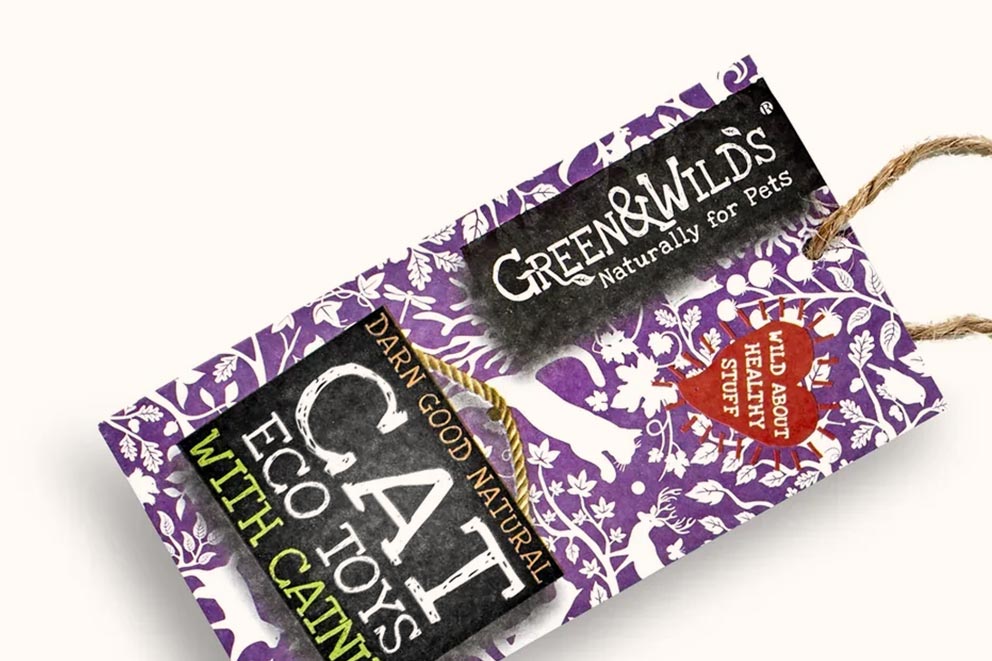
Poisonous Christmas plants
Before you deck the halls with boughs of holly, check which festive foliage may be hazardous to your cat or dog’s health:
Lilies: All parts of lily plants are highly toxic to cats and dogs, and can cause life-threatening kidney failure. Avoid all types of lilies. Take your pet to the vet immediately if you think they’ve been exposed to a lily, even if only the pollen.
Holly: The berries can lead to vomiting or diarrhoea, and the spiky leaves can irritate your pet’s skin.
Mistletoe: In the UK it’s of low toxicity, but can still cause tummy problems if the berries are eaten.
Ivy: If ingested, animals may show signs of stomach pain, vomiting, diarrhoea and skin irritation.
Poinsettia: This plant, if eaten, can lead to irritation of the mouth, excess salivation and vomiting.
Potpourri: Some potpourri is low in toxicity, while others are highly toxic – it depends what it’s made from. However, all types of potpourri, even non-toxic potpourri, can cause irritation and even obstruct your pet’s intestines, leading to reduced hunger, abdominal pain, vomiting, and diarrhoea.
Christmas trees: Though low toxicity, their pines and oils can cause mouth pain, excess salivation, vomiting or diarrhoea. More on Christmas trees below.
Other festive poisons
Christmas foods and plants are not the only poisons that pose a risk to your pet’s health. With winter comes the need for antifreeze, rock salt and cold and flu medication – all of which can be deadly to your animals.
Rock salt
Rock salt is commonly used in winter to de-ice roads. It’s a mixture of salt and grit – and is highly toxic to pets. If they get it on their fur, then lick it off, it can lead to:
- High blood sodium concentration
- Excessive thirst
- Vomiting
- Diarrhoea
- Lethargy
- Convulsions
- Coma
- Kidney damage
To prevent rock salt poisoning in dogs and cats, make sure to thoroughly wipe your pet’s paws, legs, tummy and fur after they’ve been outside. If they’re showing signs of discomfort after being outside, use a mild, pet-safe shampoo and warm water to wash the affected areas, then dry their fur completely with a towel.
If you think your pets may have ingested rock salt, take them to your vet immediately.
Antifreeze
Antifreeze is used in cars’ cooling systems, and sometimes snow globes. Antifreeze poisoning in cats and dogs can cause kidney failure, which can be fatal. If you suspect your pet has been poisoned, seek urgent veterinary attention.
Cold and flu medication
Tablets, capsules, liquid medication and medicinal hot drink cold and flu remedies contain dangerous substances for pets, including vitamins, painkillers, antihistamines (which cats and dogs are safe to consume, but only when prescribed by their vet) and caffeine. Always keep these out of reach.
If your pet eats any of these ingredients, make a note of what they’ve consumed and speak to your vet.
Fake snow
Fake snow contains harmful chemicals which can be poisonous to your animals if consumed.
Important
Never ‘watch and wait’ in any case of suspected poisoning. If you think your pet has been poisoned by any food, plant or other toxin, act fast and contact a vet for advice immediately.
Other festive dangers
As well as potential poisons, there are other Christmas dangers for pets that can cause them physical harm. Here’s how to make this season a safe, enjoyable one for your animals.
Christmas trees and decorations
Christmas trees
As well as their pines and oils being toxic, Christmas trees can pose other dangers to animals because of their:
- Needles: Fallen needles can embed in your pet’s paws.
- Water: Tree water can become contaminated.
- Lights: Pets may chew on Christmas lights cables.
- Novelty: Many cats are curious about Christmas trees, often climbing them and causing them to topple, which can injure the cat.
Christmas decorations
Many decorations are small and new to the home, meaning curious pets may attempt to chew or eat them:
- Baubles: Can be a choking hazard, damage their stomachs, or cause blockages.
- Tinsel: Can lead to life-threatening internal blockages.
- Christmas crackers: Small toys and plastic parts are a choking hazard.
- Snow globes: Can contain antifreeze, which is poisonous.
- Scented candles and wax melts: Many are toxic if ingested, and open flames can be dangerous with pets around.
Christmas gifts and cards
Pets love to get involved with the excitement of Christmas presents. They may sniff, play or attempt to chew or eat new items which can lead to harm.
Christmas gift dangers to look out for include:
- Silica gel: The little sachets that often come with new items, while not toxic, can cause stomach obstructions.
- Wrapping paper: A potential choking hazard, which often contains harmful additions like glitter or foil.
- Ribbons and labels: Other potential choking hazards.
- Edible gifts: Animals might sniff out food items and attempt to eat them.
- Batteries: A hazard if chewed or swallowed, and leaking batteries can cause chemical burns.
- Small toys: If ingested, can lead to blockages of your pet’s stomach or intestines.
- Cards*: These can sometimes contain glitter or foil, which is harmful to pets.
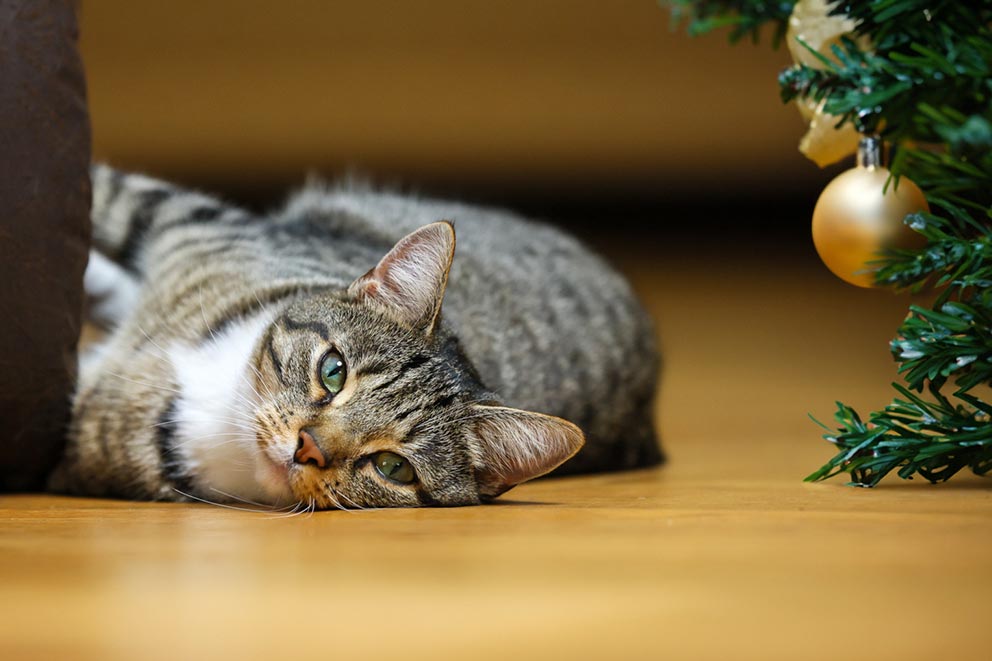
How to Pet-proof your Christmas tree and decorations
- Sweep up any fallen needles around your tree.
- Use a heavy stand so it's harder to topple over – it may also stop cats from climbing the Christmas tree from the bottom.
- Or anchor the tree to a wall to prevent it falling.
- Secure baubles and other ornaments to the branches so they can’t get knocked off.
- Avoid using breakable baubles – if you do, hang them higher up and out of reach.
- Avoid using chocolate or edible decorations.
- Ensure electric lights and tinsel are out of reach.
- Provide alternative cat enrichment – such as toys and feeding puzzles to keep pets occupied elsewhere.
If your cat or dog has eaten a bauble, tinsel, or other Christmas ornament, contact your vet immediately.
*In 2019, the RSPCA removed glitter and foil from our FSC certified Christmas cards to ensure they were more environmentally friendly. This is part of our pledge to reduce waste and non-recyclable content, and crackdown on dangerous plastics that are impacting our environment.
How to tell if your pet has:
Something lodged in their throat?
Signs that there’s a foreign body blocking the throat can be:
- Gulping/trying to swallow lots
- Gagging, retching, coughing
- Attempting to vomit but nothing happens
- Drooling
- Pawing at face
- Difficulty breathing/noisy breathing
- Collapse – if full obstruction
Something blocking their intestine?
Signs of an intestinal foreign body or blockage can be:
- Vomiting
- Reduced appetite
- Diarrhoea
- Straining to defecate
If you notice any of the above signs, take your pet to a vet immediately.
Christmas pet care checklist
Beyond poisons and hazards, Christmas can be a stressful time for pets. Planning your own pet-friendly Christmas can minimise stress and maximise joy for both you and your animals, which is why we’ve put together our own festive checklist:
General advice
- Stick to their normal routine: Keeping to your pet’s daily rituals – walks, mealtimes, etc – will reduce stress.
- Provide them somewhere to escape: A cosy, quiet space where they can retreat to.
- Plan ahead: If you're going away over Christmas, be sure to make plans for your pets.
- Provide a nutritious diet: So they don’t go hungry and searching for food.
- Keep them entertained: Provide your pet with suitable toys and activities.
- Keep an eye on them: Monitor their behaviour to see if anything is out of the ordinary.
- Keep the number of an emergency vet on hand: In case of accidents or if your pet eats something they shouldn't.
- Stock up on pet medication if needed: If your pet is on medication, make sure you have enough available over the holidays.
- Keep dangers out of reach: Put any poisonous or hazardous Christmas foods, plants (and collect dropped leaves and petals), medications, pesticides, etc, somewhere pets can’t get to them.
- Encourage any children to stay calm around pets: Christmas is exciting for kids, which may stress pets out.
- Be an advocate for your pets: Let any family members or visitors know that your pet may need extra privacy and care over Christmas.
- Spend time with them: It’s the season of spending time with those you love, including your creatures – this will reduce their stress and increase your bond.
- Keep your outside space safe: Ensure your garden or other roaming areas are free from (and not overhung by) poisonous plants, and change outdoor water supplies regularly.
- Avoid poisonous areas: Such as where rock salt or antifreeze may be used.
- Take extra care during winter: Read our cold weather care advice for cats and dogs.
- Insure your pets: For peace of mind, make sure your vet bills are covered should the worst happen.
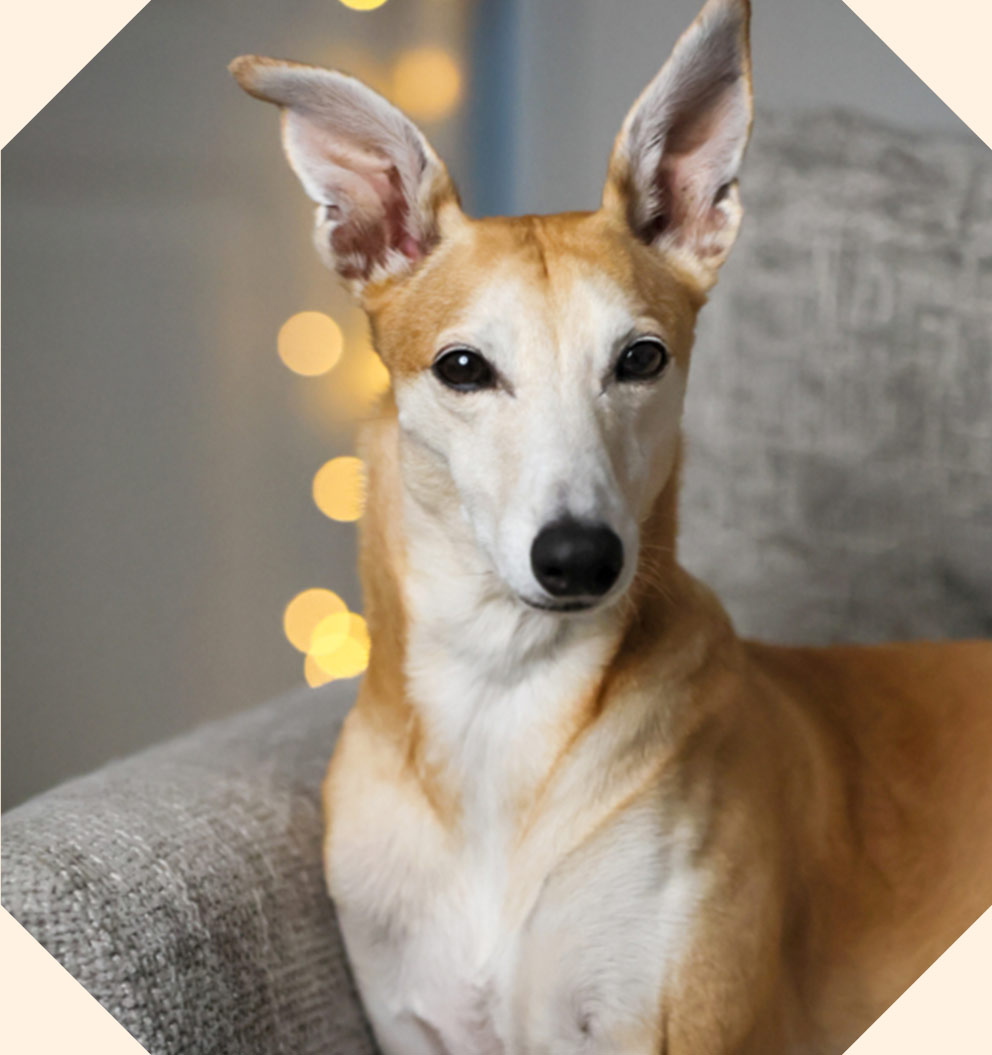
For cats and dogs
- Treat them to a new toy: Recycled toys are the best choice!
- Take your dog out: A fun Christmas walk will keep them active and entertained.
- Arrange a festive food hunt: Scatter your pet’s food around the house or garden for them to search for.
- Keep cardboard boxes: Use present boxes to hide dog food inside, and let your dog tear them up to get to the treats!
- Repurpose large boxes: Use larger cardboard boxes to make a Christmas castle for your cats.
- Get your pet presents: Things like catnip-filled toys or Christmassy dog toys.
For small pets like rabbits, guinea pigs, hamsters and gerbils
- Keep them somewhere they won’t be disturbed: Put nocturnal animals like hamsters somewhere they won’t be bothered by people during the day.
- Keep visitors away: Lots of people and new faces can be scary for them.
- Keep them in quieter areas: Away from TVs and speakers, as small animals are sensitive to high-frequency noises.
- Don’t decorate their cages: Don’t put tinsel, decorations or fairy-lights around their cage, as they may nibble on them!
- They deserve presents too: Try making your own hay cracker toy or hay ring toy.
Christmas for wildlife
Every kind of animal deserves a merry Christmas, wildlife included. To reduce waste, share your Christmas dinner leftovers with them:
Birds
Potatoes (boiled, baked, roasted and mashed)
Christmas cakes
Mince pies (especially stale ones)
Unsalted nuts and savoury snacks (chopped and crushed)
Grated cheese
Badgers
Turkey (boneless, without gravy and only in small amounts)
Potatoes (boiled, baked, roasted and mashed)
Grated cheese
Peas and sprouts
Carrots
Foxes
Turkey (boneless, without gravy and only in small amounts)
Peas and sprouts
Carrots
Important
If you do decide to leave out food for wildlife, make sure to keep your pets away from any Christmas cakes, mince pies, unsalted nuts, savoury snacks and grated cheese, as these are dangerous for cats, dogs and small animals.
Don’t feed wildlife or pets any processed meats – like pigs in blankets and stuffing – as these are incredibly high in salt.
DIY pet gifts
The festive season is a period of making and giving – there are lots of pet-friendly gifts in the RSPCA shop – but if you want to get your paws dirty, here are our elf-approved DIY pet ideas and Christmas activities:
DIY pet advent calendar and puzzle feeder
Frozen DIY heart dog treats
DIY horse cookies
DIY tuggy toy
Pet treat jar
Vegetable garland (for your chickens)
Reindeer food
Making food to leave out for Santa’s reindeers is a fun and festive activity – after all, we support every kind of animal. However, many shop- or website-bought versions contain ingredients that can be dangerous for animals (particularly edible glitter) – they’re also not environmentally friendly.
We’ve developed special wildlife-friendly reindeer food recipes, so you can embrace the festive fun while keeping animals safe. Check out the recipe here and watch our video on how to make DIY reindeer sprinkle dust. The recipe is Rudolph-recommended!
Make a donation
Making a donation is the best gift you can give to animals this Christmas (and it’ll bump you to the top of the nice list). Even the smallest donation can help us feed, care for, play with and provide shelter to the many animals that are in our care.
Alternatively, become a sponsor or find your local RSPCA charity shop for your Christmas present buying! With your help, Christmas won’t just go to the dogs – but all animals, too.
The festive season can be a wonderful time for us humans and our animal companions – but all the merriments can become distracting. Remaining vigilant, especially around food, can help us avoid any emergency trips to the vets.
Frequently asked questions
-
Take your dog to the vet immediately.
-
This is dependent on what they’ve been poisoned by, but general signs to look out for include:
- Vomiting
- Diarrhoea
- Lethargy
- Reduced appetite
- Stomach pain
- Tremors
- Convulsions
- Seizures
Not all poisons show signs immediately, and many are non-specific. If you suspect your pet has been poisoned, or are acting out of the ordinary or showing any signs that aren’t normal for them, contact your vet immediately.
-
Symptoms to look out for are:
-
Vomiting
-
Seeming depressed/sleepy
-
Appearing drunk and uncoordinated
-
Seizures (fits)
-
Difficulty breathing
-
-
Contact your vet.
-
Yes, it can be, because ornaments or baubles can be a choking hazard, or cause damage to their insides. Take your dog to a vet as soon as possible.
-
Speak to your vet to be safe.
-
Some Christmas leftovers are suitable, while others are not. See our section on Christmas leftovers above.
-
Yes, very. Raisins, sultanas, currants, grapes and other dried fruit are toxic.
-
See our Christmas plants section above.
-
Use a heavy stand so it's harder to topple over, and it may stop cats from climbing the Christmas tree from the bottom. Alternatively, anchor the tree to a wall to prevent falling.

